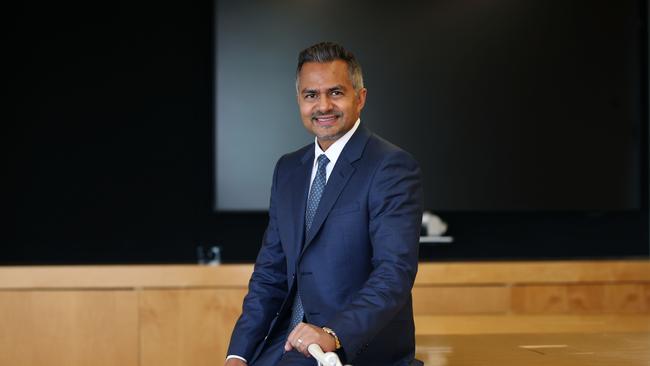Stockland rides housing boom to deliver $1.1bn profit
The country’s largest residential developer says price growth is moderating and it is looking to bring on more supply.

Business
Don't miss out on the headlines from Business. Followed categories will be added to My News.
The country’s largest residential developer Stockland has delivered a $1.1bn profit, a turnaround from a small loss in fiscal 2020, on the back of the housing boom and commercial property values lifting.
The developer cautioned that current market conditions remain challenging with ongoing lockdowns and community transmission of Covid-19 but sees the housing boom rolling on.
Stockland gave upbeat guidance but said this was on the basis that the vaccination roll out continues and restrictions ease towards the end of 2021.
Stockland chief executive Tarun Gupta pointed to the strength of the residential market and said numbers coming through in July and early August showed it was continuing despite lockdowns.
“The momentum is continuing across our portfolio which is good to see because we service, very much the first home and affordable market,” he said. House prices growth has moderated in recent months.
“Significant house price rises when wages aren’t rising as fast is not good. In that sense, we would welcome moderation of housing prices and that usually comes with increased supply, which is what we have tried to do in terms of volumes,” Mr Gupta said.
The Stockland chief said there was still capacity to sell high volumes in Victoria despite the state’s harsh lockdowns.
“The supply constraints are more prominent in Sydney and southeast Queensland,” he said. “Over the coming period, we will start to get into under-supplied markets.”
The developer is not making vaccination mandatory on its sites but Mr Gupta said that the company was strongly encouraging workers to get vaccinated.
“The sooner we can start to ease conditions, the better for the country, particularly as the vaccinations start to ramp up because there is bottlenecks in supply chains in the movement of workers, and that is holding economic growth back and the creation of new jobs,” Mr Gupta said.
Stockland’s result included revaluation uplifts totalling $432m, driven primarily by strong gains across the logistics, life sciences and technology portfolio. Its shopping centres stabilised over the half, reflecting a rebound in retail conditions and tenant demand.
The company last month bought the Halcyon’s land lease communities business, which accelerates its move into the area and was accretive to funds from operations, a key earnings metric.
The company’s FFO was down 4.6 per cent to $788m and FFO per security down 4.6 per cent to 33.1c, at the top end of previous guidance.
The residential unit had a 25 per cent jump in underlying FFO excluding transaction profits as net sales volumes leapt by 54.2 per cent to 7700 lots. Residential settlement volumes were also up 19.8 per cent to 6374 lots and the retirement unit had a strong year.
The commercial property unit had like for like FFO growth of 3.9 per cent, with many metrics better than pre-COVID-19 levels. There was a solid improvement in retail leasing activity, rent spreads and cash collection rates before lockdowns.
Mr Gupta gave a bullish outlook statement but guidance was below market expectations.
“We will continue to optimise the allocation of capital across the portfolio and accelerate conversion of our $33bn pipeline. Accelerating third party capital partnerships is a key focus as we expand our assets and funds under management and grow recurring earnings,” Mr Gupta said.
He is undertaking a review of the group and said the strategy was based on urbanisation, digitisation and the exponential growth in institutional capital.
The company declared a distribution of 24.6c per security, 2.1 per cent above the previous level, and representing a payout ratio of 75 per cent of FFO.
Stockland’s fiscal 2022 estimated FFO per security was forecast in the range of 34.6 to 35.6c. The distribution per security is forecast to be in the target payout ratio of 75-85 per cent of FFO.
JPMorgan analyst Richard Jones said that FFO was in line with the company’s recent top end of guidance. “Overall it looks a solid result,” he said. “Residential sales remained very strong in the fourth quarter with Stockland taking a large carry forward into fiscal 2022. “
Mr Jones said the residential margin surprisingly softened a bit and is guided to remain at this level. He said the company’s guidance was a bit below consensus.
Morgan Stanley analyst Lauren Berry said while the guidance was a slight miss to consensus it took into account retail rent relief. She said the early intentions of the company review were to downweight retail and retirement in order to fund the company’s expanding development pipeline.
Jarden analyst Andy MacFarlane and Lou Pirenc said the overall result was strong from a residential perspective with guidance for 6400 lots this financial year, with strong levels of contracts on hand to be delivered, but they cautioned that the outlook for commercial properties in Stockland’s trust was mixed.
Stockland shares added 1.5c to $4.56.
Originally published as Stockland rides housing boom to deliver $1.1bn profit



